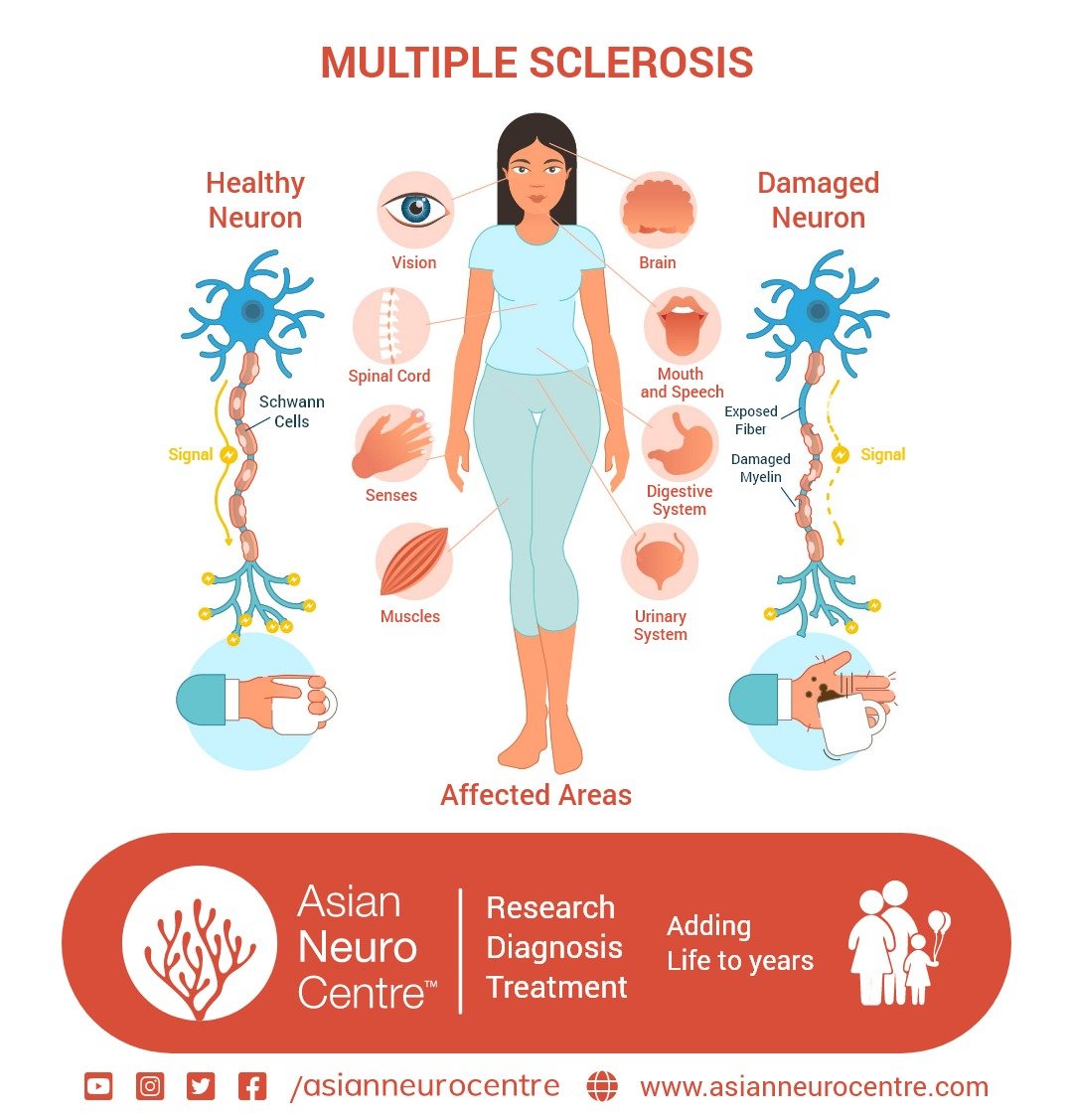- Have any questions?
- 911 12345 29
- info@asianneurocentre.com
Symptoms of Multiple Sclerosis

Good food habbits for migraine
June 16, 2021Aids Affecting Nervous System – Childhood Migraine
June 26, 2021Multiple sclerosis is a chronic disease that affects the central nervous system, which is the brain, spinal cord, and optic nerves. This can lead to a wide range of symptoms throughout the body. That means the system designed to keep your body healthy mistakenly attacks parts of your body that are vital to everyday function. The protective coverings of nerve cells are damaged, which leads to diminished function in the brain and spinal cord.
MS is a disease with unpredictable symptoms that can vary in intensity. While some people experience fatigue and numbness, severe cases of MS can cause paralysis, vision loss, and diminished brain function.
Common early signs of multiple sclerosis (MS) include:MS is a disease with unpredictable symptoms that can vary in intensity
Vision problems
Visual problems are one of the most common symptoms of MS. Inflammation affects the optic nerve and disrupts central vision. This can cause blurred vision, double vision, or loss of vision.
You may not notice the vision problems immediately, as degeneration of clear vision can be slow. Pain when you look up or to one side also can accompany vision loss. There are variety of ways to cope with MS-related vision changes.
Tingling and numbness
MS affects nerves in the brain and spinal cord (the body’s message center). This means it can send conflicting signals around the body. Sometimes, no signals are sent. This results in numbness.
Tingling sensations and numbness are one of the most common warning signs of MS. Common sites of numbness include the face, arms, legs, and fingers.
Pain and spasms
Chronic pain and involuntary muscle spasmsare also common with MS. One study, according to the National MS Society, showed that half of the people with MS had chronic pain.
Muscle stiffness or spasms (spasticity) are also common. You might experience stiff muscles or joints as well as uncontrollable, painful jerking movements of the extremities. The legs are most often affected, but back pain is also common.
Fatigue and weakness
Unexplained fatigue and weakness affect about 80 percent of people in the early stages of MS.
Chronic fatigue occurs when nerves deteriorate in the spinal column. Usually, the fatigue appears suddenly and lasts for weeks before improving. The weakness is most noticeable in the legs at first.

Balance problems and dizziness
Dizziness and problems with coordination and balance can decrease the mobility of someone with MS. Your doctor may refer to these as problems with your gait. People with MS often feel lightheaded, dizzy, or as if their surroundings are spinning (vertigo). This symptom often occurs when you stand up.
Bladder and bowel dysfunction
A dysfunctional bladder is another symptom occurring in up to 80 percent of people with MS. This can include frequent urination, strong urges to urinate, or inability to hold in urine.
Urinary-related symptoms are often manageable. Less often, people with MS experience constipation, diarrhea, or loss of bowel control.
Sexual dysfunction
Sexual arousal can also be a problem for people with MS because it begins in the central nervous system — where MS attacks.
Cognitive problems
About half of people with MS will develop some kind of issue with their cognitive function. This can include:
- memory problems
- shortened attention span
- language problems
- difficulty staying organized
Depression and other emotional health problems are also common.
Changes in emotional health
Major depression is common among people with MS. The stresses of MS can also cause irritability, mood swings, and a condition called pseudobulbar affect. This involves bouts of uncontrollable crying and laughing.
Coping with MS symptoms, along with relationship or family issues, can make depression and other emotional disorders even more challenging
10–16. Other symptoms
Not everyone with MS will have the same symptoms. Different symptoms can manifest during relapses or attacks. Along with the symptoms mentioned on the previous slides, MS can also cause:
- hearing loss
- seizures
- uncontrollable shaking
- breathing problems
- slurred speech
- trouble swallowin
Diagnosis
A doctor — most likely a neurologist — will perform several tests to diagnose MS, including:
- neurological exam: your doctor will check for impaired nerve function
- eye exam: a series of tests to evaluate your vision and check for eye diseases
- magnetic resonance imaging (MRI): a technique that uses a powerful magnetic field and radio waves to create cross-sectional images of the brain and spinal cord
- spinal tap (also called a lumbar puncture): a test involving a long needle that’s inserted into your spine to remove a sample of fluid circulating around your brain and spinal cord
Doctors use these tests to look for damage to the central nervous system in two separate areas. They must also determine that at least one month has passed between the episodes that caused damage. These tests are also used to rule out other conditions.
Moving forward
MS is a challenging disorder, but researchers have discovered many treatments that can slow its progression.
The best defense against MS is seeing your doctor (Dr, Navin Tiwari ) immediately after you experience the first warning signs. This is especially important if someone in your immediate family has the disorder, as it’s one of the key risk factors for MS.
Don’t hesitate. It could make all the difference

